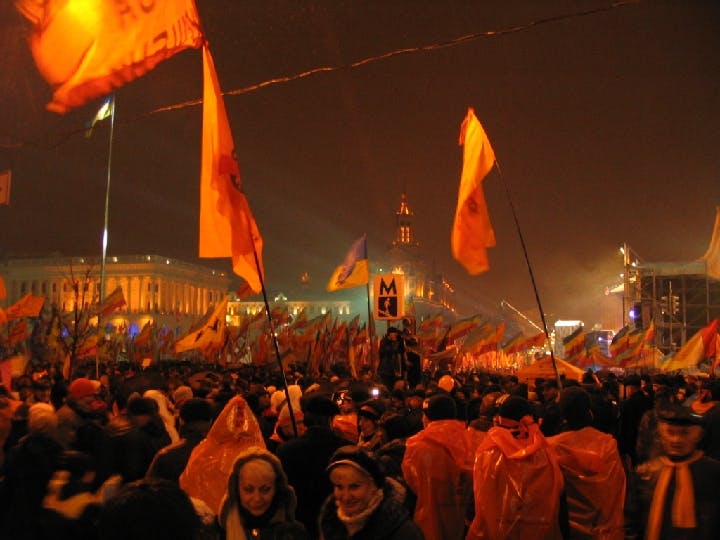Winter 2008
Postcommunist Shuffle
– The Wilson Quarterly
The Rose, Orange, and Tulip revolutions in three former Soviet Republics, says a political scientist, have amounted to little more than a limited rotation of the ruling elites.
Starting in 2003, when democracy seemed to be spreading to the most improbable nations, revolutions broke out in three former Soviet republics. The Rose Revolution toppled a blindsided Eduard Shevardnadze in Georgia and replaced him with a 36-year-old former New York lawyer. The Orange Revolution of 2004 in Ukraine installed a Westernized Viktor Yushchenko as the true winner of disputed elections, supplanting a thuggish clique later suspected of nearly killing him by dioxin poisoning. And the Tulip Revolution in 2005 in Kyrgyzstan sent authoritarian president Askar Akayev hightailing to Russia, succeeded by an opposition leader promising constitutional reform.
The revolutions followed a common pattern: a fraudulent election, massive protest demonstrations, and the installation of a new “revolutionary” leadership. All three were hailed in the West as proof that a new civil society had grown strong enough in the post-communist countries to check fraud and corruption. In former Soviet republics with incomes as low as that of Swaziland, enthusiasts saw the birth of a new era of Jeffersonian democracy.
Alas, writes Theodor Tudoroiu, a political scientist at McGill University, all three regimes now represent “nothing more than failed revolutions.” In fact, no fresh heroes rose from the grassroots, swept into power by a newly robust civil society and banished Soviet-era apparatchiks. The “revolutions” were really the product of a split in the “political elite” surviving from the Soviet era. The Rose, Orange, and Tulip revolutions were initiated and controlled by “outs” seeking to replace the “ins.”
Georgia’s new leader, Mikhail Saakashvili, once the justice minister under the regime he overthrew, has ripened into a little Napoleon Bonaparte, accumulating outsized powers and fending off lurid charges of murder and corruption. Ukraine’s president, a former prime minister and head of the national bank under the regime he defeated, did little after winning power, and finally was forced to offer the office of prime minister to a leader of the clique suspected of trying to kill him. Kyrgyzstan, whose president has polished coercive institutions to a brighter shine than in the Soviet era itself, is mired in corruption and nepotism and has suffered business-linked killings and political assassinations.
The democratic revolutions so beautifully named in the euphoria of mass street demonstrations, Tudoroiu writes, have proven to be not much more than a “limited rotation of the ruling elites within undemocratic political systems.”
* * *
The Source: “Rose, Orange, and Tulip: The Failed Post-Soviet Revolutions” by Theodor Tudoroiu, in Communist and Post-Communist Studies, Sept. 2007.
Photo courtesy of Flickr/Alex
